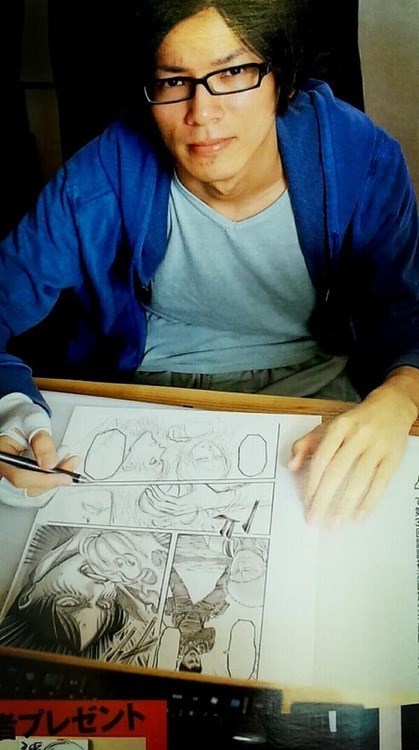 |
| (http://es.shingeki-no-kyojin.wikia.com/wiki/Hajime ()) |
Hajime Isayama is a name that few
people in the United States will know. In his home country of Japan, he is a
celebrity author who rivals the likes of Suzanne Collins, author of the Hunger Games series, or Veronica Roth,
author of the Divergent series. He is
the author of the popular Attack on Titan
manga, which was also turned into an anime and even translated into English.
The anime was so popular that it gained attention in the US even before the
company Funimation translated it into English. This anime introduced me to
the entire, massive world of anime and
manga, and it has done the exact same thing for thousands of other people.
Anime and manga are sometimes viewed
as strange because they come from a different culture than ours, and some of
the concepts are alien to us. There is also a large community of anime
watchers such as myself, in America.
Many of these people were introduced to anime and manga, which is the original
book form, by one of the many great writers. Hajime Isayama is only the most
recent of these writers, others including Akira Toriyama, author of Dragon Ball, and Masashi Kishimoto,
author of Naruto. Isayama and Attack on Titan introduced me to this genre
I love so much now, and then I explored the works of other authors and got
immersed in the worlds that these people create. These worlds that the authors
create are what captivate the readers and pull them into the vast world of
anime. One thing that anime does well to do this is have characters that are
deep, and that have almost as much internal conflict as external conflict. This
may not seem too impressive to the average American, but when you consider the
limits on what you can show with animated characters, it gets much more
impressive.
There are limits on the amount of
emotions and feedback that the authors can show with their characters. Isayama,
along with many other authors, does not let this get in the in the way of the
quality of his work. Isayama instead
takes this limit and goes in a complete different direction, instead of trying
to overcome it. He creates situations that would be impossible in reality
instead of making real life situations. Isayama has created a world where there
are massive walls that everyone has to live behind. The titans, who only exist
to kill and eat humans, rule over everything outside the walls. This is
something that only animation or drawings could bring to life. Not only does
this work well, it also gives Attack on
Titan and other animes or mangas a quality that live-action movies or TV
shows could never hope to have. The advantage of the animation is that authors
can let their imaginations loose. Nothing is off limits as long as someone can
draw it. The real world limits us with such fundamental things as the laws of physics
and nature. The fictional worlds and the characters in these worlds that the
authors create do not have to abide by those rules. Isayama's work is a
breeding ground for imagination.
There is one thing that may make
someone realize just how real anime can feel to someone who's immersed in it.
Many animes contain a lot of fighting and external conflict. Dragon Ball/Dragon Ball Z and Naruto are both full to the brim with
battles and people fighting each other. What those animes do is like taking the
most mindless movie character, and giving him the depth of the most
thought-provoking movie character. Isayama takes this a step further. In Attack on Titan there are unique titans,
like the colossal and armored titans that seem to be instruments for destroying
the walls. However, instead of leaving them at that, Isayama makes you think
about them and why they appear so suddenly, why they seem to be able to think,
unlike the rest of the titans. Attack on
Titan leaves no character as an open book.
Attack
on Titan does many things well, but its greatest quality is the way it will
make you think. It is always putting you and the characters in situations where
everything you were sure about gets turned upon itself. The good guys will
become the bad, and you will be left wondering how you could have been so
wrong. Yet somehow, this just makes you even more invested in the intricate
plot. One of the times this happens is when you finally figure out that the
titans may not be what they seem, but yet they seem even scarier than ever
before. Out of nowhere, Isayama introduces the concept of the titans having at
least an intelligent leader, if not intelligence itself. When I say at least I say it because that is all
that can be said. Even in the many chapters that have come out since then,
Isayama has not told the reader anything. He
once again leaves you confused as before, even though you thought you
had learned something incredibly important. Isayama makes his characters experience
pain and loss, making them seem all too real to the reader. Everyone that
watches or reads Attack on Titan has
different theories about what will happen next, and that makes reading it feel
different to everyone. Attack on Titan
turns senseless violence into a complicated maze of a plot that you can't help
but follow, entranced by the thought of what might happen next.
He may not have done anything on
purpose to better the lives of people, but Hajime Isayama has introduced me and
thousands of others to the world of anime. Isayama most definitely changed my
life for the better by expanding and reigniting my imagination, and has done so
for many others. He is a hero.
Page created on 1/30/2015 12:00:00 AM
Last edited 1/30/2015 12:00:00 AM
